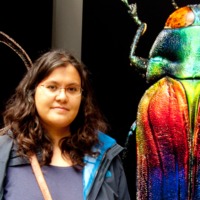
Helen De Cruz
I am senior lecturer in philosophy at Oxford Brookes University. Before, I was an assistant professor at the VU Amsterdam, postdoctoral fellow of the British Academy at Oxford University, and postdoctoral fellow of the Research Foundation Flanders at the University of Leuven. My work is concerned with the question why and how humans form beliefs in domains that are quite remote from everyday life, such as in mathematics, theology and science. How do the concepts in these domains relate to our everyday, ordinary cognitive skills? What is the evolutionary origin of our capacities to form beliefs in these abstract domains? I argue human high-level cognitive processes have precursors in nonhuman animal cognition (e.g., a sense of numbers is shared with other vertebrates), but that humans have expanded their conceptual toolkit by their reliance on other minds and on material culture.
less
Related Authors
Ann-Sophie Barwich
Indiana Bloomington
Clifford Sosis
Coastal Carolina University
Samuel Wheeler
University of Connecticut
Josh Law
University of Bristol
Abrol Fairweather
San Francisco State University
Quill Kukla
Georgetown University
Joshi Radin
School of the Art Institute of Chicago
Kurt Borg
University of Malta
Joel Sati
University of California, Berkeley
InterestsView All (42)










Uploads
Books by Helen De Cruz
Addressing a wide variety of empirical claims that are of interest to philosophers and psychologists of religion, a team of psychologists and philosophers apply data from the psychology of religion to important problems in the philosophy of religion including the psychology of religious diversity; the psychology of substance dualism; the problem of evil and the relation between religious belief and empathy; and the cognitive science explaining the formation of intuitions that unwittingly guide philosophers of religion when formulating arguments.
Bringing together authors and researchers who have made important contributions to interdisciplinary research on religion in the last decade, Advances in Religion, Cognitive Science, and Experimental Philosophy provides new ways of approaching core philosophical and psychological problems.
Papers by Helen De Cruz
Addressing a wide variety of empirical claims that are of interest to philosophers and psychologists of religion, a team of psychologists and philosophers apply data from the psychology of religion to important problems in the philosophy of religion including the psychology of religious diversity; the psychology of substance dualism; the problem of evil and the relation between religious belief and empathy; and the cognitive science explaining the formation of intuitions that unwittingly guide philosophers of religion when formulating arguments.
Bringing together authors and researchers who have made important contributions to interdisciplinary research on religion in the last decade, Advances in Religion, Cognitive Science, and Experimental Philosophy provides new ways of approaching core philosophical and psychological problems.
To get a clearer picture of how philosophical skills translate into the non-academic job market, I conducted interviews with seven philosophers who work outside of academia. They are working as consultant, software engineers, ontologist (not the philosophical sense of ontology), television writer, self-employed counselor, and government statistician. With permission of the seven interviewees, this is a short digest of their answers.